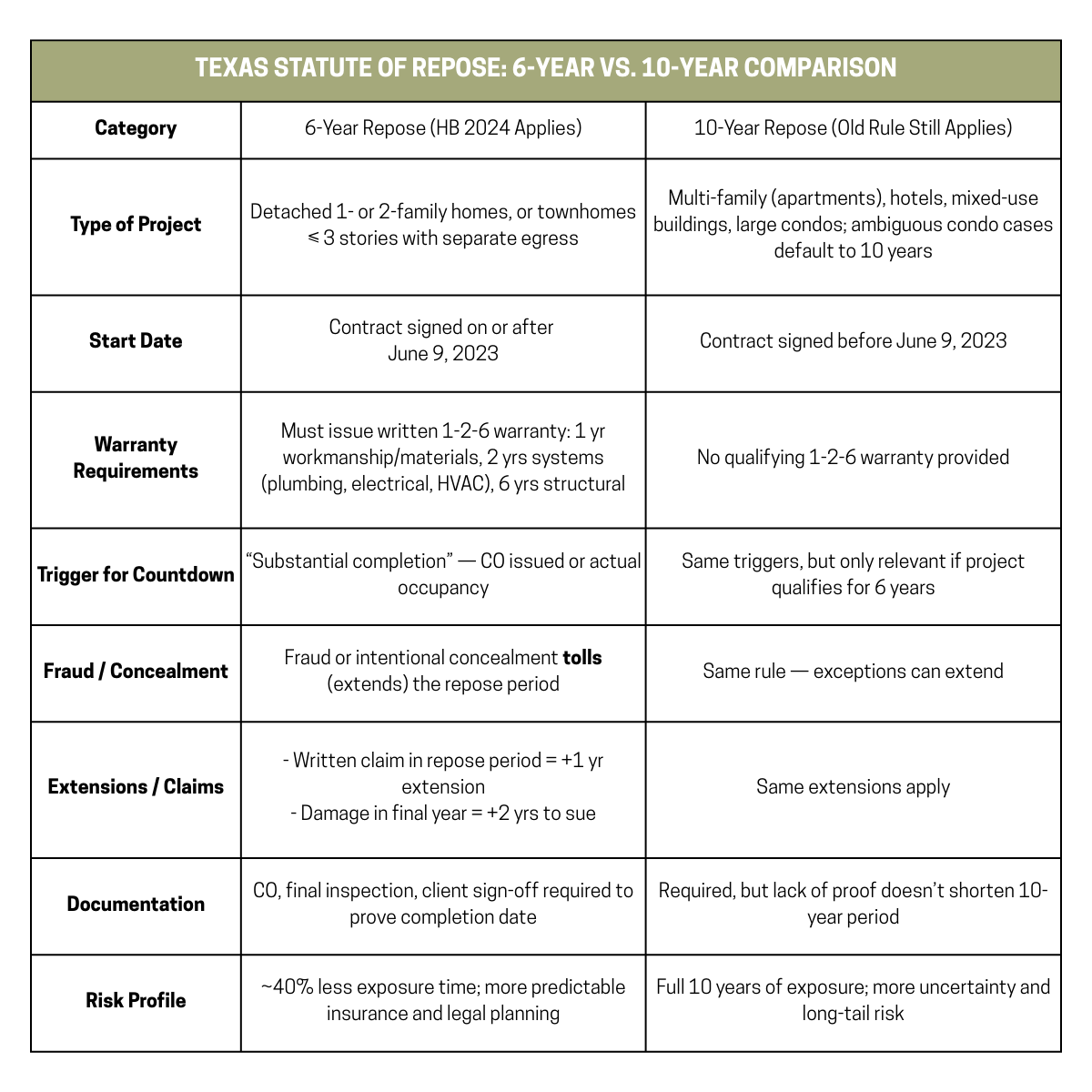What You Need to Know About Texas’ New 6-Year Statute of Repose
A Win for Homebuilders — But With Conditions
Texas has reduced the statute of repose for certain residential projects from 10 years to 6 years. That means less time you’re exposed to potential lawsuits — but this isn’t an automatic change for every job. To benefit from the shorter period, you must meet very specific requirements on project type, start date, and warranty terms. Miss any of these, and you’ll remain under the 10-year limit.
When the 6-Year Limit Applies
To qualify, your project must meet all of the following:
1. Project type:
Detached single-family homes, duplexes, or townhomes up to three stories with their own separate exit
2. Warranty:
You provide a written 1-2-6 warranty at sale:
1 year for workmanship and materials
2 years for plumbing, electrical, and HVAC systems
6 years for major structural components
3. Start date:
The contract is signed on or after June 9, 2023.
4. Completion trigger:
The clock starts when the home reaches substantial completion, typically when the certificate of occupancy is issued or when the buyer moves in.
When the 10-Year Limit Still Applies
The old rule remains in effect if any of the following are true:
The project is non-residential (apartments, hotels, large condos, or mixed-use buildings).
It’s a condominium that may not meet the “residence” definition under the law.
You did not issue the required 1-2-6 warranty.
The contract was signed before June 9, 2023.
There is evidence of fraud, intentional concealment, or willful misconduct.
How the Deadline Can Be Extended
Even if you qualify for the 6-year limit, these events can extend the window:
Written homeowner claim during the 6-year period → extends the deadline by 1 year.
Damage or injury in the final year → gives the homeowner 2 additional years to sue from the date of damage.
Fraud or concealment → tolls (pauses) the time limit until the issue is discovered.
Why This Matters to Your Business
When you qualify, the new statute:
Cuts your long-term liability by nearly half — from 10 years to 6.
Makes insurance planning more predictable — risk is easier to price.
Helps align warranties with legal limits — less mismatch between contractual promises and legal exposure.
When you don’t qualify, you’re still under the full 10-year liability window. This makes documentation and contract compliance critical.
Action Plan for Builders
To make the 6-year statute work for you:
Update your contracts. Add the 1-2-6 warranty and clearly define “substantial completion.”
Keep proof of completion. Certificates of occupancy, inspection reports, and homeowner sign-offs should be stored in one place.
Train your team. Make sure sales, warranty, and customer service staff know which jobs qualify.
Watch the timelines. Track Year 6 closely; written claims can extend liability.
Consult your attorney. Especially for condos and unique or mixed-use projects.
6-Year Vs. 10-Year Comparison
The new 6-year statute of repose is a strong advantage for Texas homebuilders if you follow the rules exactly. Projects that miss the requirements will still be subject to 10 years of potential claims. The difference comes down to the details: project type, start date, warranty, and documentation. Contact us today to learn more.

